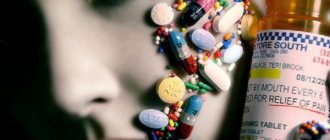0 8553 January 13, 2020 at 06:49 pm Author of the publication: Evgenia Astreinova, psychologist
Severe depression and fear plague my life daily. For a long time and hopelessly, I have seemed to myself insignificant, useless and unloved. Neither meditation nor intensive work on oneself helped to overcome this depression, and the feeling of fear only intensifies every day. How to stop being afraid?
I'm afraid to make phone calls about work. Fear of leaving the house alone. Fear of falling asleep without the light on. And most importantly, my depression is inextricably linked with a feeling of fear of death: from a sudden brick falling on my head, a car accident, a medical error, and God knows what else. What should I do if depression and fear of death have turned my life into a living hell? How to fight and win this endless battle with yourself, with your depression, fear and anxiety?
Manifestations of Fear
Anxiety and fear are quite similar concepts. But if anxiety is a situational reaction of a person, then fear is the emotion of any danger. For a sick person, fear is fear for his past misdeeds, even the most insignificant ones. And while anxiety or depression can still be somehow circumvented, it is almost impossible to get rid of fear.
But fear in a healthy person is not always a manifestation of his weakness. Yes, it is fear and fear that prevent many indecisive people from achieving something in life. Under the influence of fear, people can think and make decisions much faster. If a person has managed to cope with his fear, then he has the opportunity to look at life in a new light.
How to get out of depression?
Proven advice from psychologists will help and tell you how to get out of depression on your own when you have no strength to do anything.
Tip #1: Take responsibility.
Tip #2: Watch interesting and inspiring TV shows and movies.
Tip #3. Avoid solitude and loneliness. Communicate with people around you more often. Attend interesting events. Find yourself an exciting activity or hobby.
Tip #4. Allow yourself to accept help from other people.
Tip #5. Turn to the spiritual world.
Tip #6. Avoid alcohol and other drugs completely. They negatively affect the state of people’s psyche and worsen it with each use.
Tip #7. Regulate your sleep. Only long and healthy rest can restore the human nervous system.
Tip #8. Get some exercise.
Tip #9. Do something useful for the people around you unselfishly - show love to them, and they will reciprocate.
Tip #10. Use affirmations.
The most important thing is for a person to be aware that his state of despondency, emptiness and melancholy are signs of an emerging serious illness. The sooner he understands this, the sooner he will begin to think about how to overcome depression himself. If you don’t want it to come to visiting doctors, try to make every day of your life as eventful and informative as possible.
- First of all, tell your family and friends about your condition, allow them to help you with advice, and do not refuse their participation in solving your problem. The main thing is not to isolate yourself.
- Even if you don’t feel like it, go for a walk, go to a cafe or a movie with friends, try to return to activities that previously brought you joy.
- Set yourself a task. If you find it difficult, divide its implementation into several stages. Now it is important for you to regain your consciousness of your own importance, usefulness, and necessity. If despondency returns to you, drive it away and, through your strength, continue to move towards your intended goal. Overcome yourself a couple of times, see that later you will feel better, and the painful state will return less and less often. After all, only through the manifestation of your own willpower will you understand how to overcome the blues and depression.
- Another important point - during the recovery process, try not to make serious decisions. For example, put off a wedding, renovation, or job change for a while.
- Read more positive fiction, watch funny programs and comedy films that will help you relax internally.
- If you begin to feel a surge of strength, gradually give your body physical activity.
- If you feel your appetite returning, eat delicious food that gives you pleasure. And be sure to take vitamins to boost your immunity.
- Try to live a full life again, and then the question of how to overcome melancholy and depression will gradually fade into the background.
Just remember that the signs of the disease will disappear gradually. Don't expect immediate results. You now know how to overcome depression and despondency. Therefore, be patient, and your efforts will be rewarded with a complete recovery.
Many types of depressive disorders
Indeed, today there are a lot of them. At the same time, the classification is constantly updated. Depending on the type of reaction to external influences today there are:
- Hysterical;
- Alarming;
- Hypochondriacal;
- Melancholic.
Today we are interested in anxious depression, because it occurs very often in medical practice.
Signs of Depression
When I read medical books, I was amazed and regretted that I had not come across them earlier. Or rather, they didn’t interest me. I read and was amazed at how close everything was to me, once again making sure that everything was fine with me, that I don’t hate life and people, that you can find meaning and be happy if you just work on this problem. Below I publish for you excerpts from medical reference books that contain patient reviews describing the condition they are in:
- Weakness, lethargy, laziness, powerlessness, depression, sadness.
- Lack of self-confidence, exaggeration of real difficulties, inability to pull oneself together.
- Loss of the ability to enjoy various personal and social events, loss of interest in many things. The future seems aimless.
- Tearfulness, irritability, grumpiness, touchiness.
- I don’t want to live, a feeling of inner devastation, complete indifference, the disappearance of all feelings, even in relation to loved ones - the so-called painful mental anesthesia.
- The variability of the external world - “the light faded, the foliage faded, the sun began to shine less brightly, everything moved away and froze, time stopped.”
How to overcome depression with psychotherapy?
If you can't cope with depression on your own, don't worry. This disease can be treated quite successfully with the help of modern methods of psychotherapy and special medications - antidepressants. Moreover, psychotherapy can be used as an independent method of treatment, without the use of medications.
It is worth recognizing that not everyone rushes to the doctor to quickly resolve the issue of how to overcome depression. The fear that others will find out about this is sometimes stronger than the awareness of the need for treatment. But it's not right. After all, psychotherapy is designed to help the patient understand those aspects of his life that could provoke the disease.
- confidential conversation between the doctor and the patient;
- carrying out various tests to determine the severity of the disease;
- modeling of various life situations in which the patient himself must find the right solution;
- conducting relaxation sessions accompanied by specially selected music.
During treatment, the patient must inform the doctor about changes in his health. Sometimes, to overcome depression, a psychotherapist may use hypnosis. If such treatment does not give the desired results, then medication is added.
To treat various types of depression, special medications are used - antidepressants. These medications help restore the balance of biologically active substances and normal brain function. With such treatment, it is especially important to follow all the recommendations of the attending physician, trying to avoid interruptions in taking them.
However, if after three to four weeks the drug taken does not bring the expected effect, the doctor may replace it with another one. If the patient feels improvement, in no case should you stop taking medications on your own, because to achieve a sustainable result, the duration of the minimum course must be at least four months.
- Zoloft;
- "Cipramil";
- "Coaxil" and others.
Antidepressants of the new generation in relation to the older ones differ in such qualities as:
- improved tolerability;
- fewer side effects;
- lower toxicity;
- greater safety in case of overdose.
However, they also cost significantly more. I would especially like to note that antidepressants are not addictive. In many cases, when treating depression, the simultaneous use of psychotherapeutic techniques and drug treatment is especially effective.
Today, there are two main types of treatment for depression: self-treatment or with the help of doctors.
Treatment by specialists is the most preferable and effective option. Since it is almost impossible (or very difficult) to get out of depression on your own when you have no strength to do anything.
Doctors, as a rule, are not supporters of self-treatment of diseases, especially if it concerns complex mental disorders in a person.
Let's take a closer look at the most modern, safe and effective methods of treating all kinds of mental disorders.
It should be noted that, first of all, successful therapy depends on established emotional contact between the patient and the psychotherapist. Only with a trusting and friendly relationship, the result of the therapy used will not be long in coming, and it will also be stable and more pronounced.
Main areas of treatment:
- Hypnotherapy.
- Social therapy.
- Classical psychotherapy.
- Treatment with drugs.
- Electroconvulsive therapy.
Today, experts are trying to use aggressive methods of treating depression, namely, electroconvulsive or drug therapy, exclusively in serious health problems, when the mental disorder is complex and lasts quite a long time.
To achieve the best treatment result and its long-lasting effect, the desire of the patient himself to get rid of depression forever is of great importance.
During the rehabilitation process, patients are obliged to strictly follow all doctors’ recommendations, as well as monitor their own behavior and try to establish friendly and trusting relationships with people around them.
In order to prevent all kinds of psychological disorders, it is recommended to monitor the occurrence of initial signs of depression, and also try to get rid of them in a timely and effective manner.
If you think that you have become irritable and hot-tempered, notice mood changes, lose emotional attraction to everyday activities, or have problems sleeping, then you urgently need to think about proper rest, or a change of job and other changes in your life.
A properly designed daily routine also plays an important role in getting rid of the initial signs of depression.
Fear, anxiety and depression
It is well known that depression is characterized not only by anxiety, but also by fear. If anxiety is a situational reaction, then fear is the norm for any person when an emotional reaction to danger arises. Fear in a person suffering from a depressive state is facing the consequences for their imaginary misdeeds, as well as crimes. It is difficult for a person to completely get rid of or abstract from the feeling of fear.
Fear is the strongest factor that prevents a person from opening up from all sides, as well as achieving success in life. The feeling of fear allows people to make strategic decisions in a short time. Having overcome fear, new opportunities open up for people, and life is perceived differently. Being in all its manifestations begins to be appreciated, and the world around us turns into a brighter one.
Causes of Anxious Depression
The main reason why symptoms of the disorder appear is a fixation of attention on factors that are traumatic to the psyche. Normally, anxiety about some important events occurring is common to everyone. But the excitement quickly passes when the situation itself ends. With an alarming form of depression, nervous tension does not leave a person, even if nothing threatens him.
This condition can be caused by long-term exposure to stress factors. Most often, patients note the existence of interpersonal conflicts at work or in the family. A strong stress-forming factor is the inability to satisfy one’s needs. In the anxiety form of the disorder, a person’s depression is aggravated by the fact that he does not find a way to satisfy desires in the future.
A constant cause of stress is an intense work schedule. The lack of proper rest and relaxation during the day, the fear of doing something wrong or at the wrong time form a mixed anxious and depressive state, which gradually transforms into a mental illness.
Mental disorder
Some mental disorders are accompanied by increased anxiety, which can lead to the formation of phobias. Disorders most closely associated with this phenomenon are phobic and anxious personality disorders, psychotic depression, and obsessive-compulsive disorder.
Relaxation techniques for anxiety
- Regulating breathing provides control over the condition when a person develops strong fear for no reason, a panic state. To slow down and deepen your breathing, you need to sit down, place one hand on your stomach and inhale slowly. The stomach should rise under the hand, but the shoulders should remain in place. Hold your breath for 4 or 5 seconds, then exhale very slowly. Repeat until you feel calmer.
- To further relieve inner tension and stress, simply place a drop of lavender essential oil on a handkerchief or cloth and hold it to your nose and inhale as often as you like. Alternatively, apply some oil to your forehead and sit quietly for a few minutes.
- A warm bath is one of the most pleasant and reliable ways to calm down and influence emotions. To enhance its effects, add a little lavender oil to the water and soak to your heart's content.
The impact of negative emotions on the body
Although stress can be a positive motivator (e.g., advancement at work, performance on an exam), professional research shows that chronic stress has the same negative effects on the body as unhealthy diet, lack of sleep, sedentary lifestyle (common in people spending a lot of time in the office).
75-90% of people who visit doctors suffer from illnesses caused by stress and depression.
Why do stress and depression have a negative impact on health? This is mainly due to the fact that stressful conditions cause changes in hormonal balance, which increases the incidence of inflammation and many other problems.
When exposed to the body for a long time, stress enters the “chronic” stage. The danger of this condition lies in the increased risk of developing cardiovascular diseases, diabetes, mental, autoimmune diseases, and digestive disorders. Depression is even involved in the development of cancer, overweight, and obesity.
According to recent clinical studies, if your life is full of stressful situations (hardly anyone lives in complete peace), you should include regular activity in your work schedule: exercise, meditation, spending time in nature. It is often impossible to influence the causes of stress, but you can change your reaction to it - develop stress resistance.
The human body is able to cope with stress. Some of the effects of stress can be learned to be used in positive ways (such as becoming more mindful), but at the same time it is important to suppress or prevent negative reactions (upset stomach, eating too much unhealthy food).
General symptoms of the disorder
- panic attacks;
- disturbances in the functioning of the autonomic organ system (cardiovascular system, respiratory system, etc.);
- headache;
- general weakness;
- sleep disorders;
- depression;
- emotional tension.
All these signs are easy to detect when the patient comes into contact with the subject of the phobia.
Types of phobias
- Panic attacks are intense fear and a feeling of imminent death, accompanied by increased sweating, heart rhythm disturbances, dizziness, nausea, difficulty breathing and a feeling of the unreality of what is happening.
- Agrophobia is a fear of open spaces, large crowds of people, and in severe cases, fear of leaving one’s own home or room.
- Hypohodrical phobias are the fear of contracting some disease or the feeling that a person is already terminally ill.
- Social phobias are the fear of being the center of attention, being criticized or ridiculed.
Factors in the development of phobias
The causes of phobias are being studied in various fields of science, and at the moment there is no clear opinion. There are 4 common versions about the factors in the development of phobias.
A significant amount of empirical data allows us to link the development of phobias with psychologically traumatic events. In this case, the object of the phobia can be directly associated with what happened or indirectly associated with the trauma, for example, fear of leaving the house in the dark, fear of deserted places, and so on.
The appearance of such phobias for some time, in the process of experiencing the consequences of trauma, is a normal phenomenon; if the phobia becomes persistent and haunts a person for years, this is a good reason to consult a doctor.
Symptoms in women
Before you learn how to independently lift yourself out of depression and overcome it, you need to understand what contributes to this condition and what its symptoms are.
They can appear at any age. Mood also changes with hormonal surges, but natural factors, genetics and life situations significantly increase the risk.
What causes apathy:
- Puberty. Fluctuating moods associated with changing hormone levels are normal. This period can often take place in connection with conflicts with parents and identity problems.
- Premenstrual syndrome. In this case, you shouldn’t google “How to save yourself from depression and cure it,” because irritation, migraines and bloating are short-term symptoms, and melancholy itself is nothing more than a bad mood.
- Pregnancy. This is also due to hormonal changes. But difficulties such as lifestyle, job change, miscarriage or infertility can only make the situation worse.
- Postpartum stress. The feeling, called the “baby blues,” usually disappears within two weeks. But low self-esteem, feeling like a terrible mother, thoughts of suicide or harming the baby, and poor sleep are all more serious conditions that require immediate treatment.
- Menopause. Women do not experience apathy as such, but certain factors increase the risk of its occurrence: anxiety, weight gain, stress.
You will need the help of a specialist who will tell you how to overcome depression and learn to enjoy life if the following signs appear:
- Regular feelings of guilt, sadness, or worthlessness;
- loss of interest in favorite activities;
- constant fatigue or pain that occurs for no reason;
- difficulty concentrating or remembering;
- feeling like life is no longer worth living.
If you discover these manifestations in yourself, do not hesitate to contact professional psychologists. In my consultations, I am always ready to help cope with depression.
Psychologist Daria Milai
Make an appointment
Elimination of phobias
The most popular of these techniques is the systematic return to a normal mental state, which involves creating a system of fear stimuli. For example, in the case of a fear of snakes, the system could include 10 levels, ranging from mild anxiety (simply looking at a photograph of a snake) to terrible - a live snake wrapped around the body. The subject, having entered a state of relaxation and peace, begins to work with the least frightening situation, using parallel techniques to remain in a relaxed state. The subject moves through the levels as the situation becomes more complex, while remaining relaxed and calm, progressively returning to a normal mental state.
The flotation chamber and rest room (or "dry" flotation chamber) have had unprecedented success in treating phobias through a technique of returning to a normal mental state. This is quite understandable, because... flotation promotes an incredibly deep level of relaxation and enhanced visualization.
Diagnostic features
There is a certain circle of people who are most predisposed to mild forms of anxiety. This means that under unfavorable circumstances, they have every chance of earning a serious disorder. It is extremely important to carry out the diagnosis in such a way that there is no error in diagnosis. However, there are neither laboratory nor instrumental methods that allow this to be done. To understand the patient, you must talk to him personally.
Anxiety and depression are very often accompanied by delusions. This does not indicate a clouding of reason, but it leaves an imprint not only on the life of the person himself, but also on his loved ones. A sick person is convinced that all his “crimes,” often very exaggerated, will have to be answered. This manifestation is not a sign of depression. What is more important here is the level of anxiety, which changes throughout the entire period of the disease.
A few facts
Did you know that:
- Women are affected by this disease almost 2 times more often than men. The reason for this is both biochemistry (For example, female hormones - estrogens), and the mass of social roles assigned to the fair sex and responsibility for them in addition. But this phenomenon can also be explained by the fact that gentlemen visit specialists much less often and therefore are not taken into account in statistics.
- Genetics plays an important role in the development of the condition. If at least one of the parents suffered from the blues, then the risk that the child will encounter difficulties is almost 3 times higher. However, the corresponding genes do not exist in nature. The reason is due to low levels of serotonin (the hormone of joy) in the blood.
- This way to relieve depression at home, like medication, is not always suitable. In science, the disease is called “therapeutically resistant”, and the diagnosis is made after six weeks of unsuccessful treatment.
- Apathy can cause hallucinations. Typically, imaginary images that appear to a person in reality indicate the development of Parkinson's disease or dementia. But this also happens during depression. Moreover, the phenomenon is considered widespread. And studies conducted in Britain have proven that almost 50% of teenagers who hear voices in their heads experience all sorts of non-psychotic disorders, including this one.
- Creative individuals are most often subject to the blues. In various forms it manifested itself in the most brilliant musical (Bach, Beethoven) and religious figures (Martin Luther), masters of the pen (Jack London). There are quite a few versions about the foundations. The reason is the special structure of the brain, thanks to which such people see and feel more than others (which pushes them towards art). Or those who are immersed in creativity stop paying attention to everyday matters. And the accumulated lump drives them into melancholy.
Periods of exacerbation and remission
The stronger the tension, the more pronounced the fear, anxiety and depression. Therefore, if you have a responsible event coming up that will also require a serious investment of effort, then you should think about whether it’s worth taking on. The period of exacerbation manifests itself especially clearly when, having given 100%, you failed. A person is overcome by delusional ideas: “I am guilty and deserve punishment.”
Duration of treatment
It is important to emphasize to the patient that social phobia is a chronic disease that will likely require long-term treatment.
Even if treatment is carried out for 6 months, the relapse rate after drug withdrawal is about 50%.
Therefore, medications should be discontinued gradually, with periodic attempts to reduce the dose. Management of patients who do not respond to treatment
Pharmacotherapy should begin with the most effective and safe drug available. After the initial treatment period (1–2 months), clinical effectiveness should be assessed. If the patient’s symptoms persist to a significant extent, the doctor may increase the dose to the most effective one or prescribe a drug from a different group. You should also remember about the possible use of psychotherapy in addition to taking medications.
Somatic (bodily) manifestations of depression
One of the typical masks of depression is the physical (somatic) manifestations of depression. They may look like digestive disorders, stomach, headaches or heart pains, itchy skin, various neuralgia, etc. When a person develops such symptoms, this, naturally, first of all leads him to suspect that he has any serious somatic diseases. He consults doctors and undergoes numerous examinations, as a result of which no physical cause of the disease is discovered (or minor disorders are found, the correction of which does not lead to the desired relief of the general condition).
Therefore, it is important to understand that our mental state is closely related to our physical state, and sometimes mental suffering manifests itself in exactly this way: in the form of a somatic illness. Therefore, if medical examinations have been thoroughly carried out, and the physical cause of suffering has not been discovered, it makes sense to seek help from a psychotherapist.











